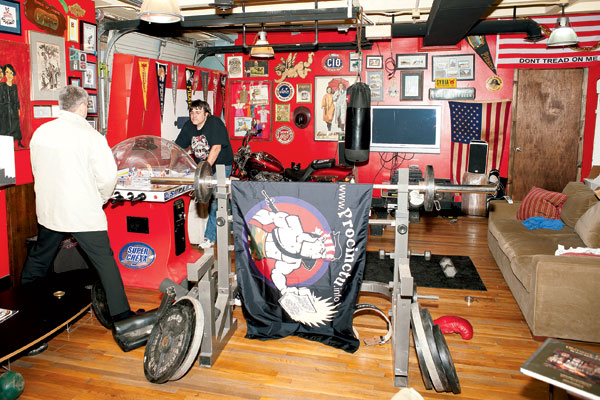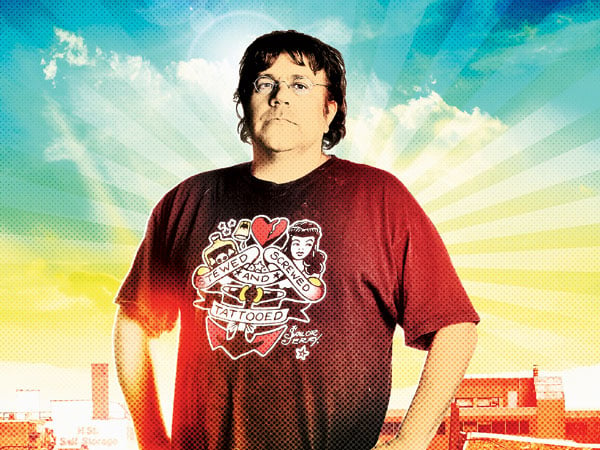
Despite all of its diversions, Englert’s “office” bores him. He rarely stays long. Photograph by Erik Uecke.
When I first e-mailed Englert requesting an interview, he wrote back: “I would like to lay down some ground rules.”
My heart sank. I had once covered national politics as a newspaper reporter. “Ground rules,” I came to learn, were the sine qua non of the Washington interview. What’s on the record, what’s off, how to identify sources–all are subject to torturous negotiation.
Then I read Englert’s list: “You may not accompany me to any Ancient Order of the Hibernian meetings or quilting bees. No mentioning of my former career as a power forward for the WNBA’s Minnesota Lynx. No photographs of me in a unitard during hot yoga sessions. I will not reveal my deviled egg recipe.”
That, in a capsule, is Englert’s view of the postures and pretensions of official Washington, with its sometimes insufferable air of seriousness.
If there’s a balloon anywhere, Englert is inclined to pop it. In the late 1980s, he published a parody of the Washington City Paper called the Cilly Paper: Washington’s Weakly. An Onion-like lead story, headlined do the white thing, described a plot by then-mayor Marion Barry to bring about his own overthrow by a white mayor.
“I’ve done my best,” (the bogus) Barry, then deep in scandal, is quoted as saying, according to a contemporaneous account in the Washington Times. “I’ve lied, cheated, even listened to country and western music. What else can I do?”
When the Times asked why he’d taken aim at the City Paper, Englert replied, “When things get on a plateau, it’s time.”
Each of the mini-golf holes at H Street Country Club is a grotesque of a DC bugbear: an overzealous parking-meter attendant, a row of K Street lobbyists rendered as Lego-style robots, the Springfield interchange pretzeled into a loop-de-loop roller coaster.
“The obstacles in the putt-putt are really metaphors for the obstacles”–real or imagined–“in Joe Englert’s life.”
Councilman Tommy Wells told me that Englert apprised him of plans for the golf course over breakfast: “Joe says, ‘Yeah, one of the holes will be Marion Barry coming out of the ground like The Awakening,‘ ” Wells recalled, referring to the Seward Johnson sculpture, originally at Hains Point, of a mythical giant clawing himself from the earth. “I said, ‘Joe, you’re spending too much time lying awake at night thinking about stuff.’ But then he goes and does it.”
In the finished mini-golf course, Wells sees autobiography. “It’s part of his working out his frustrations with DC,” he said. “The obstacles in the putt-putt are really metaphors for the obstacles”–real or imagined–“in Joe Englert’s life.”
Englert was born in 1961 and raised in New Kensington, a working-class town a half hour northeast of Pittsburgh. A grandfather had left southern Italy for a job as a laborer at Alcoa, the aluminum company that was the town’s major employer. Englert’s father, William, was a department head at the Pittsburgh Plate Glass Company.
The family lived on a tree-lined street populated by the upwardly mobile sons and daughters of the first wave of white ethnic immigrants. “Diversity was the different countries of Eastern Europe,” Englert says.
His older brother was the serious, obedient student, his older sister the homecoming queen. Joe, the youngest of three, was a chubby boy given to suspenders. He played Santa Claus in the first-grade play and amused relatives at age five by climbing into the band shell at a local park and strumming a toy guitar while singing Beatles songs.
In a possible harbinger, Englert took a childhood interest in beer cans. His father fed his collection with odd containers scavenged on business trips. Soon Englert was making trades at local conventions and the attic was awash with cans from around the world. “We still have some up there we’d like to get rid of,” his mother, Sylvia, says.
In their youngest son, his parents saw imagination dueling with irreverence. In high school, he started a comedy newsletter, “The Irregular Citizen,” that outed a library teacher for shopping on the clock. When the local chamber of commerce sponsored a high-school essay competition on ideas for improving New Kensington, Englert’s entry–which was passed over–suggested a wholesale bulldozing of the town.
At Penn State, Englert threw theme parties that turned the rooms of his off-campus group house into stage sets. For a Star Trek shindig, Englert built the deck of the starship Enterprise out of appliance boxes and fashioned hundreds of tribbles–purring, hairball-like aliens from an episode of the TV show–from tennis balls and wig scraps found at the Salvation Army. Another party mimicked a small-town homecoming dance. On the living-room floor, Englert marked out the lines of a basketball court in masking tape, set out a Nerf hoop and punch bowl, and asked a couple of girls to dress up as chaperones, complete with name tags.
These were not parties, his college friend Chris Clifford, told me: “These were events.“
Englert stayed in State College, Pennsylvania, after graduation and ran a singing-telegram business for a couple of years–“ape costumes, chicken costumes”–before moving into a large house in Northwest DC in 1984 with a group of college friends.
Typically, Englert had his hand in a dozen things at once. He freelanced quirky features for local papers. He wrote ad copy for motor oil. He edited a newsletter for the US Merchant Marine. He penned two never-published novels (“nowhere to be found,” he said when I asked to see them), and cowrote a movie, Woobie’s Geography Lesson, shown at the Kennedy Center, about an Ethiopian immigrant struggling to make his way in Washington.
He dreamed of being the next Kurt Vonnegut or Jean Shepherd, but reality set in. There was one job, however, for which no one doubted his qualifications: theme-party impresario.
In the 1980s, DC by and large shut down at 5 pm. What little there was of nightlife was formulaic. Preppies went to the Third Edition in Georgetown. People with black jackets and tattoos went to Posers in the West End. Capitol Hill staffers to the Hawk ‘n’ Dove. Lawyers and bankers to Bow Tie’s.
“I guess I wanted people to mix it up a little,” Englert says. “I had no problem hearing Public Enemy with Frank Sinatra with the Ramones in the same place on the same night, but you would never get that.”
In 1988, Englert approached the owner of Danker’s, a downtown steakhouse that was closed on weekends. His proposition: Let me turn your second floor into a dance club on Friday and Saturday nights; you keep the bar receipts, I keep the door. With a $180 ad in the City Paper advertising alternative music, Englert recalls, he had “an instant crowd,” visits from Washington Post reviewers, and a couple hundred bucks in his pocket every weekend. He called the place Club Random.
Danker’s tossed Englert out a few months later after alcohol inspectors found a 16-year-old who’d slipped in, but by then Englert had his eyes on his own place. In 1990, 15 Minutes opened in an old cafeteria on 15th Street between K and L in downtown DC. A Post reviewer called it a “chameleon club–‘not too black, not too white, not too young, not too old’ and not too smart for squares.” Chairs were painted with skulls and crossbones; a fish tank swarmed with snakeheads. DJs played everything from Cajun and progressive to hip-hop, and funk bands jammed in the back room.
Steve Zarpas, a partner in some of Englert’s early bars who later broke with him, was then a young commercial-real-estate broker who admired Englert’s derring-do. He found Englert the location, floated the lion’s share of the start-up costs, and handled the paperwork. “Joe had blind ambition and the hubris of ‘why can’t I?,’ which was infectious,” Zarpas says by phone from Norfolk, where he lives. “People wanted to help him out and see him succeed.”
The club was an overnight phenomenon. “It cost us $8,000 to get into business,” Englert says, “and we’d do that much on a Friday night.”
Eve Zibart, the nightlife columnist for the Post in those years, says Englert seemed to foresee DC’s rebound in the 1990s as the District straightened out its finances and young professionals began rediscovering cities. His places were “pretty much a complete departure,” Zibart says. “He recognized a whole new Washington developing that the high people had not noticed.”



















